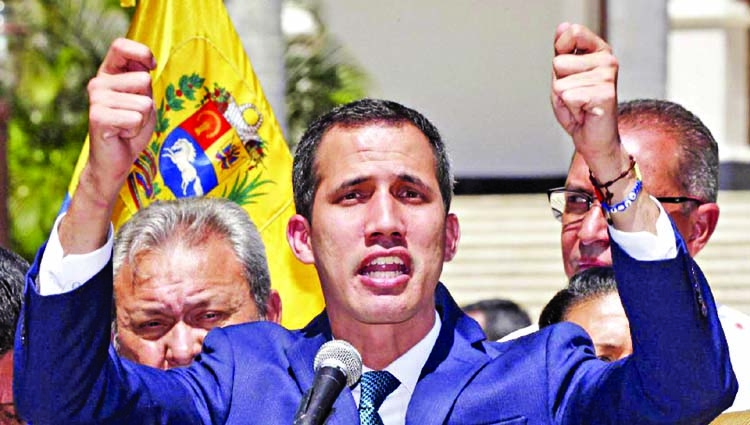EU nations back Guaido

International clamor for snap elections in Venezuela intensified Monday as European powers recognized opposition chief Juan Guaido as interim leader, after President Nicolas Maduro rejected an ultimatum to call early voting. Britain, France and Spain were among 16 EU nations to side with Guaido, following in the footsteps of key regional powers and the United States, which has refused to rule out a military intervention in the crisis-wracked country.
But key Maduro ally Russia slammed what it called interference in the oil-rich but now poor Latin American country.saying it was an attempt to "legitimize usurped power."Guaido thanked each EU country in turn on Twitter "for supporting all Venezuelans in this struggle we undertake to rescue our nation's democracy, freedom and justice."
Claiming his legitimacy from the constitution, the 35-year-old National Assembly leader stunned the world when he proclaimed himself interim president on January 23, setting up a tense standoff with Maduro -- with both men heading rival massive street rallies in Caracas on Saturday.
Guaido is trying to force from power the socialist leader -- labeled a dictator by the West and his Latin American neighbors after presiding over Venezuela's economic collapse -- aiming to set up a transitional government and hold new presidential elections.
Despite Guaido's pleas for their support, the armed forces -- the country's key power -- have remained loyal to Maduro. But the opposition leader has expressed confidence he will win over senior officers after a top air force general publicly sided with him on Saturday.
Guaido lost no time in building on broadened international support, with his fledgling alternative administration announcing February 14 talks in Washington on responding to "the largest hemispheric humanitarian crisis in modern history."The opposition leader says up to 300,000 people are at risk of death from malnutrition and illness after years of shortages of basic food and medicines.
The US and other countries have already pledged humanitarian aid for Guaido's administration, though it remains to be seen where and how it can enter the country without the military's support.The young lawmaker accused the military of planning to divert aid being stockpiled in Colombia, Brazil and an unidentified Caribbean island, in order to distribute it through the socialist government's subsidized food program for supporters.
Guaido appealed to the military's "conscience" to let the aid reach those most in need.It remained unclear how Guaido could fund and operate an interim presidency with Maduro refusing to budge.He accused Maduro of trying to illicitly transfer up to $1.2 billion from public coffers to a bank in Uruguay.
Guaido also said Maduro was seeking to move the money from the Venezuelan Economic and Social Development Bank to its branch in Uruguay and urged the Montevideo government "not to lend itself to stealing."France, Germany, Britain, Portugal, Austria, Sweden, Estonia, Latvia, Lithuania, Finland, the Czech Republic and Luxembourg also recognized Guaido. Ten EU countries have yet to announce their position.
US Secretary of State Mike Pompeo welcomed the European states' recognition of Guaido, and urged others to follow suit.The cascade of support from EU countries came after the passing of a Sunday deadline for Maduro to call presidential elections.Maduro flatly rejected the demands in an interview with Spanish television, insisting he would not "cave in to pressure."
Venezuela's foreign ministry announced a "review" of its diplomatic relations with EU states over their recognition of Guaido, saying they were effectively supporting plans for a coup.Maduro began a new term in office last month after 2018 elections branded illegitimate by the opposition.In the interview, he supported plans for a meeting of Latin American and EU states in a "Contact Group" in Montevideo on Thursday, saying it would lead to "dialogue."
Maduro has rejected all offers of aid, dismissing it as the thin edge of a wedge of US military involvement.Under Maduro's stewardship, oil-dependent Venezuela has plunged into an economic crisis, suffering from hyperinflation and shortages of food and medicine.On Monday, oil prices rose to their highest level yet this year on European markets on the back of the crisis in Venezuela.
Consultancy Eurasia warned that US oil sanctions are "set to have a broad impact" with the government facing "the prospect of running out of gasoline, which could serve as another social catalyst."Forty people were killed in clashes with security forces in a week of protests coinciding with Guaido's self-proclamation as acting leader, according to the United Nations.Local NGO Foro Penal said almost 1,000 people were detained between January 21 and 31.It said Venezuela now has its "largest number of political prisoners" in 18 years, including 82 members of the armed forces.
